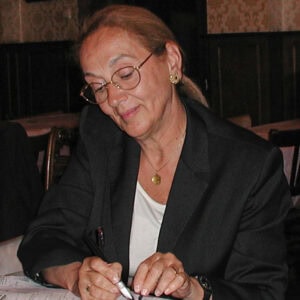
Marta Petricioli
Marta Petricioli, a prominent Italian scholar in Middle East studies and professor of history at the University of Florence, died on February 14, 2024.
Born in 1940 in Tuscany’s Lunigiana district, Marta earned a bachelor’s degree, summa cum laude, from the University of Florence under the guidance of diplomatic historian Rodolfo Mosca. In November 1966, as a graduate student, Marta gained international recognition as one of the leading “Angels of the Flood,” volunteers who diligently rescued manuscripts and artworks during a devastating flood. This act showcased Marta’s deep attachment to her adopted city, her dedication to public service, and her meticulous preservation of historical artifacts.
After graduating in 1970, Marta held positions within the University of Florence’s political science and international history departments. She established one of postwar Italy’s pioneering Middle Eastern history programs and founded the prestigious Italian group Sesamo (Society for Middle Eastern Studies). During the Cold War and its aftermath, Marta was among the most active elected members of the bureau of the Association internationale d’histoire contemporaine de l’Europe, linking scholars from a dozen countries, in Eastern and Western Europe.
Marta’s interdisciplinary approach combined area studies, social history, and traditional diplomatic relations across a wide chronological spectrum. Her notable debut, Italy in Asia Minor: Balance of Power and Imperial Ambitions in the Pre–World War I Era (Sansoni, 1983), drew from archives spanning five nations and cemented her reputation as a historian renowned for navigating pivotal moments in European and Middle Eastern history. Long before the term “transnational history” came into vogue, Marta intuitively embraced this methodology with precision and flawless storytelling.
Marta’s subsequent research continued in this vein, yielding numerous essays in international journals and notable monographs, including Archaeology and Mare Nostrum: Archaeological Missions and Italy’s Mediterranean Policies, 1898–1943 (V. Levi, 1990) and Beyond the Myth: The Italian Settlements in Egypt (1917–1947) (Mondadori, 2007). Her collaborative efforts led to the co-editing of several books covering diverse topics, including the post–World War II European Left, European peace movements and integration, war crimes in Italy and Japan during World War II, and the shaping of national identities in the Mediterranean and its borderlands.
Marta, as she was known to her students, was above all a dedicated mentor. With a profound grasp of diverse academic fields and genuine empathy, she enriched the learning experiences of countless undergraduate and graduate mentees. What began as simple tutorials evolved into personalized sessions, addressing career aspirations and personal matters, offering invaluable life advice. To Marta, many of her students became akin to an extended family. In an era where scholarly output often overshadowed faculty availability, she struck a delicate balance, preserving traditional mentoring while adapting to evolving career demands. Nestled in Florence’s prestigious Palazzo Vasari, she deliberately shunned modern distractions like social media and television. Despite her secluded lifestyle, Marta frequently welcomed fellow scholars, from local or worldwide institutions, and provided them valuable mentoring for their research in Italian archives. She also occasionally hosted larger gatherings of colleagues and students in her home. Surrounded by a vast library, these gatherings evoked the intellectual salons of the past, blending academic discourse with conviviality.
Friends and colleagues fondly recall Marta’s unwavering commitment to cultivating cosmopolitan connections, often in challenging circumstances, including her well-known fear of flying. That phobia did not deter her from traversing long distances, through her more congenial and—as many things in her life—romantically time-bound modes of travel, such as train rides extending as far as Moscow or boat journeys to Turkey and neighboring regions. To colleagues able to witness such an arrival at a Mitteleuropean station, Marta exuded a practical elegance that belied the strains of her lengthy journey, carrying an aura of stoicism, determination, and historical resonance, resembling the subjects of her own studies.
A brilliant historian and master teacher, Marta Petricioli was one of the leaders of a generation renowned for their ambitious archival research and their consummate cosmopolitanism. She is missed by her family of relatives, as well as her large academic family, to whom she was always “Marta.”
Alessandro Brogi
University of Arkansas
This work is licensed under a Creative Commons Attribution-NonCommercial-NoDerivatives 4.0 International License. Attribution must provide author name, article title, Perspectives on History, date of publication, and a link to this page. This license applies only to the article, not to text or images used here by permission.